【英语】一般将来时详解+例句
-一般将来时的四种句型

一般将来时的四种句型1. “主语+will+动词原形”句型。
哎呀,比如说,“I will go shopping tomorrow.”(我明天会去购物。
)你看,这多简单直接呀,我就是明确地表达了我明天要去做的事情呢。
2. “主语+be going to+动词原形”句型。
嘿,就像“He is going to play basketball this afternoon.”(他今天下午打算去打篮球。
)这不是很清楚地说出了他的计划嘛。
3. “will be+形容词/名词”句型。
哇塞,“It will b e sunny tomorrow.”(明天会是晴天。
)这样就能轻松描述未来的状态啦。
4. “be going to be+形容词/名词”句型。
你想想,“She is going to be a great singer.”(她将会成为一名很棒的歌手。
)多有憧憬呀!5. “主语+will+be+动词的现在分词”句型。
像“ They will be waiting for us at the station.”(他们将会在车站等我们。
)多形象呀!6. “主语+be going to+be+动词的现在分词”句型。
“We are going to be having a party tonight.”(我们今晚将会举行一个派对。
)是不是很带感?7. “will+have+过去分词”句型。
“I will have finished my work by 5 p.m.”(到下午 5 点我将会完成我的工作。
)多有成就感呀!8. “be going to+have+过去分词”句型。
“They are going to have built the house by next month.”(到下个月他们将会建好那所房子。
)多厉害呀!9. “will+动词原形+其他成分”句型。
“He wille and help you.”(他会来帮助你。
一般将来时详解+例句

【答案】C
【解析】
试题分析:根据时间状语within 15 years,故用一般将来时。
考点:时态考查题
点评:通过时间状语,上下句意思和具体语境来确定时态。
4.--I have you asked John to come to the party this evening?
A.would increaseB.will increase
C.would have increasedD.will be increasing
【答案】B
【解析】
试题分析:考查时态。If条件句使用的是一般现在时代替一般将来时,所以主句也是一般将来时,和next year搭配使用。句意:如果我们的营销计划成功,我们明年销售将增加百分之三十。故B正确。
考点:考查动词时态。
10.- Will you be available at three o'clock tomorrow afternoon?
- No. I ______ a lecture then.
A.are attendingB.will have attendedC.will attendD.will be attending
【答案】A
【解析】
试题分析:考查时态。句意:杰姆斯,你知道明天是凯特的生日吗?真的吗?我今天下午下班后会给他买一个礼物。买礼物的动作将来某一时刻做的事情,用一般将来时。故选A。
考点:考查时态。
16.Mrs. Morris has left for London. She ________ a speech there next week.
六年级英语一般将来时讲解加练习
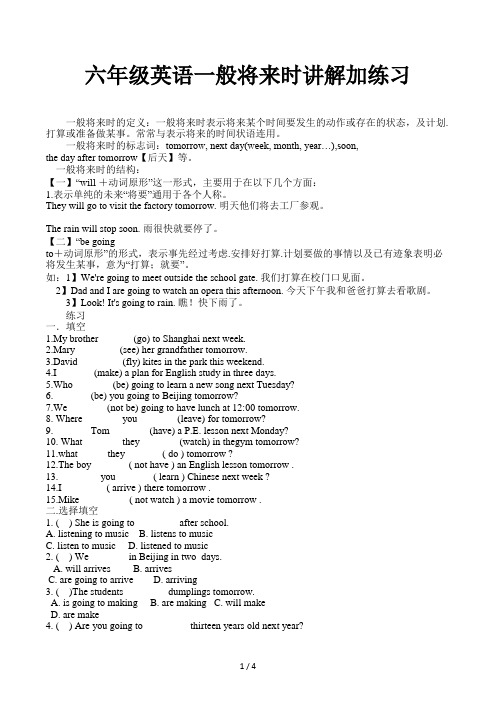
六年级英语一般将来时讲解加练习一般将来时的定义:一般将来时表示将来某个时间要发生的动作或存在的状态,及计划.打算或准备做某事。
常常与表示将来的时间状语连用。
一般将来时的标志词:tomorrow, next day(week, month, year…),soon,the day after tomorrow【后天】等。
一般将来时的结构:【一】“will +动词原形”这一形式,主要用于在以下几个方面:1.表示单纯的未来“将要”通用于各个人称。
They will go to visit the factory tomorrow. 明天他们将去工厂参观。
The rain will stop soon. 雨很快就要停了。
【二】“be goingto+动词原形”的形式,表示事先经过考虑.安排好打算.计划要做的事情以及已有迹象表明必将发生某事,意为“打算;就要”。
如:1】We're going to meet outside the school gate. 我们打算在校门口见面。
2】Dad and I are going to watch an opera this afternoon. 今天下午我和爸爸打算去看歌剧。
3】Look! It's going to rain. 瞧!快下雨了。
练习一.填空1.My brother ______ (go) to Shanghai next week.2.Mary ________ (see) her grandfather tomorrow.3.David ________ (fly) kites in the park this weekend.4.I_______ (make) a plan for English study in three days.5.Who _______ (be) going to learn a new song next Tuesday?6._______ (be) you going to Beijing tomorrow?7.We _______ (not be) going to have lunch at 12:00 tomorrow.8. Where _______ you _______ (leave) for tomorrow?9._______ Tom _______ (have) a P.E. lesson next Monday?10. What _______ they _______ (watch) in thegym tomorrow?11.what _____ they _______( do ) tomorrow ?12.The boy _______( not have ) an English lesson tomorrow .13.________ you _______( learn ) Chinese next week ?14.I ________ ( arrive ) there tomorrow .15.Mike _________ ( not watch ) a movie tomorrow .二.选择填空1. ( ) She is going to ________ after school.A. listening to musicB. listens to musicC. listen to musicD. listened to music2. ( ) We _______ in Beijing in two days.A. will arrivesB. arrivesC. are going to arriveD. arriving3. ( )The students ________ dumplings tomorrow.A. is going to makingB. are makingC. will makeD. are make4. ( ) Are you going to_________ thirteen years old next year?A. will beB. areC. beD. go5. ( ) ___will see a play in 5 days?A. WhenB. WhatC. WhoD. Whose6. ( ) Mary______ English next year.A. will learnB. will to learnC. are going to learn.D. learns7. ( ) He’ll _____ shopping this afternoon.A. goingB. goC. goesD. went8. ( ) Will you ____ at the bus stop at 10:30?A. meetingB. meetsC. meetD. met9. ( ) Lily and I _______ the guitar. next week.A. am going to playB. are going to playC. will playsD. play10. ( ) How ______ Jenny ___ home tomorrow?A. does......goB. is……goingC. will……goD. do……g o11. ( ) Who is going to _________ a song ?A. sings B singing C. to sing D. sing12. ( ) I _________in Beijing in three days.A. are going to arriveB. arriveC. will arriveD. arrives13. ( ) He _______some model planes tomorrow .A. going to makeB. is makingC. will make D makes14. ( ) Are you going to ___________a doctor next year ?A. will beB.. areC. beD. are going to15. ( ) She ________ you make supper this evening .A. helpsB. will helpC. is helpingD. is going help三.把下列句子变成一般疑问句,并给出肯定和否定回答。
高考一般将来时详解+例句
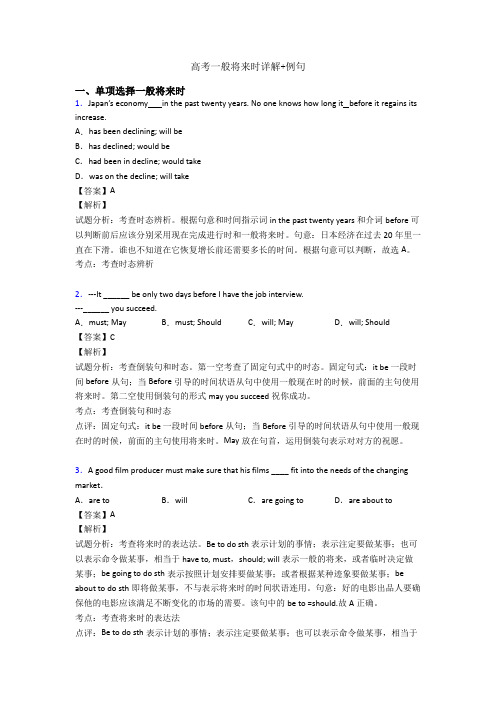
A.rained; rainsB.is raining; shall rain
C.has been raining; rainsD.has rained; will rain
考点:考查时态辨析
2.---It ______ be only two days before I have the job interview.
---______ you succeed.
A.must; MayB.must; ShouldC.will; MayD.will; Should
【答案】C
A.getsB.has been got
C.will getD.is getting
【答案】C
【解析】
试题分析:句意为“截止到医生检查完你的肺部,你才将会得到检查结果。By the time引导的是时间状语从句,从句中用现在完成时代替将来完成式,故主句用一般将来时。所以选C。
考点:考查时态
14.If their marketing plans succeed, they ________ their sales by 20 percent.
A.will haveB.am going to haveC.hadD.am having
【答案】A
【解析】
试题分析:句意:--早饭你准备吃什么?--我想我想吃些面包和牛奶。因为是将要吃..用一般将来时,排除C,ABD都可以表示一般将来时,will是临时决定,be going to do是计划,打算,be doing是即将,马上做…,所以选A。
11.If our marketing plan succeeds, we _______ the sales by thirty percent next year.
一般将来时的英语句型
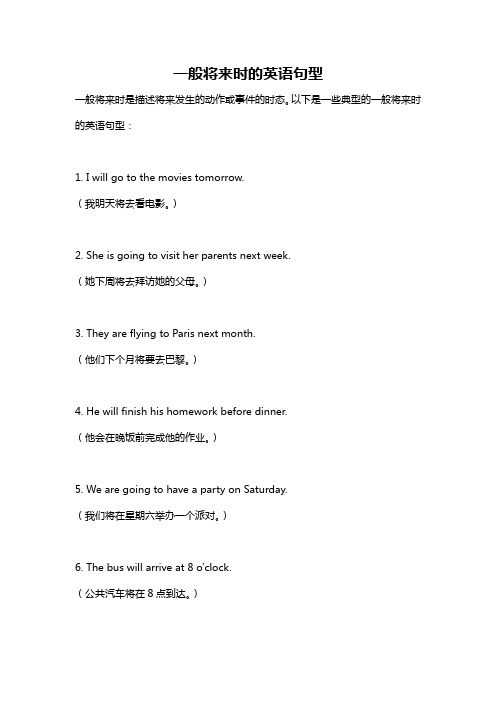
一般将来时的英语句型
一般将来时是描述将来发生的动作或事件的时态。
以下是一些典型的一般将来时的英语句型:
1. I will go to the movies tomorrow.
(我明天将去看电影。
)
2. She is going to visit her parents next week.
(她下周将去拜访她的父母。
)
3. They are flying to Paris next month.
(他们下个月将要去巴黎。
)
4. He will finish his homework before dinner.
(他会在晚饭前完成他的作业。
)
5. We are going to have a party on Saturday.
(我们将在星期六举办一个派对。
)
6. The bus will arrive at 8 o'clock.
(公共汽车将在8点到达。
)
7. She is going to start her new job next week. (下周她将开始她的新工作。
)
8. They will meet at the park tomorrow evening. (他们明晚将在公园见面。
)
9. We are going to travel to Europe next year. (明年我们将前往欧洲旅行。
)
10. He will call you later tonight.
(他今晚晚些时候会打电话给你。
)。
一般将来时用法及例句

一般将来时用法及例句
一般将来时(Simple Future Tense)表示将要发生的动作或事件。
在英语中,通常用辅助动词“will”或“shall”加上动词原形来构成一般将来时。
用法:
●肯定句:主语+ will/shall + 动词原形
1.I will meet her at the airport tomorrow.(明天我会在机场见她。
)
2.She shall call you later.(她会稍后给你打电话。
)
●否定句:主语+ will/shall + not + 动词原形
1.They will not come to the party.(他们不会来参加派对。
)
2.He shall not forget your birthday.(他不会忘记你的生日。
)
●疑问句:Will/Shall + 主语+ 动词原形+ 其他?
1.Will you help me with my homework?(你会帮我做作业吗?)
2.Shall we go to the cinema tonight?(我们今晚去电影院好吗?)
一般将来时用于预测、打算、意愿、承诺等将来的事件或行为。
大家可以多多练习。
【英语】一般将来时详解+例句

【答案】A
【解析】
试题分析:考查动词时态。句意:给他提姆买个手机怎么样?毕竟他不再是个孩子了。我认为是必要的,因为我们有时会想确认他是否会回来吃饭。根据句意这是一个宾语从句,确认他是否将回来吃饭,是一般将来时,A. will come一般将来时B. comes一般现在时C. has come现在完成时D. would come过去将来时,所以A正确。
A.has been declining; will be
B.has declined; would be
C.had been in decline; would take
D.was on the decline; will take
【答案】A
【解析】
试题分析:考查时态辨析。根据句意和时间指示词in the past twenty years和介词before可以判断前后应该分别采用现在完成进行时和一般将来时。句意:日本经济在过去20年里一直在下滑。谁也不知道在它恢复增长前还需要多长的时间。根据句意可以判断,故选A。
3.—Did you tell your parents about the result?
—Oh, no, I forgot. Ithem now.
A.will be callingB.will callC.am going to tellD.am to call
【答案】B
【解析】
句意:A选项是将来进行时,表示将来某个时间正在进行的动作;B、C、D均表示一般将来时。will+v原形表示临时决定的;而be going to do和be to do是表示按计划或安排要做的事。根据语境可知说话人是经别人提醒才临时想起要把结果告诉他父母,所以应该用will+v原形。句意:--你告诉你父母结果了吗?--没有,我忘了。我现在就去告诉他们。
英语一般将来时讲解

一般将来时一、一般将来时定义:一般将来时表示将来某一时刻,或将来某一段时间内的动作或状态。
二、一般将来时两个招牌单词will/shall,shall用于第一人称单数,如:shall I…,I shallshall we 。
we shall will则通用三、基本结构will/shall + V原四、缩略形式will 常简略为'll,并与主语连写在一起,如:I'll,he'll,it'll,we'll,you'll,they'll。
例句:Will you be free tonight? 你今晚有空吗?We won’t(shan’t) be busy this evening. 我们今晚不忙。
He’ll go to London next weekWe’ll only stay for two weeks. 我们只待两星期。
We’ll go to the Great Wall if it is fine tomorrow.We shall have a delicious dinner tonight. 今晚我们将美餐一顿。
Shall we go to the park ,tonight ??Tomorrow will be Sunday. 明天就是星期天。
The rain will stop soon. 雨很快就要停了。
Shall we go there at five? 我们五点钟去那儿,好吗?Will you please open the door? 请你把门打开,好吗?五、用法基本用法:“助动词will或shall+动词原形”这一形式,表示将来发生的事情,用于征求对方的意见或表示客气的邀请。
在口语中will用于所有人称,书面语中第一人称常用shall。
如:I can see you're busy, so I won't stay long.我看得出你很忙,所以我不会呆太久。
一般将来时用法总结
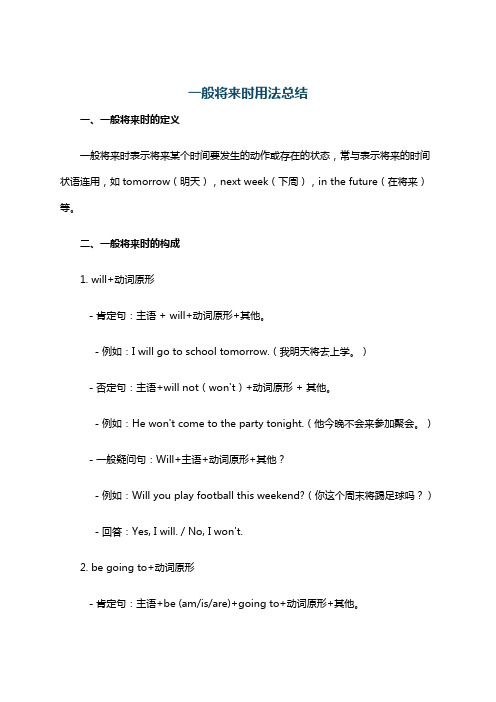
一般将来时用法总结一、一般将来时的定义一般将来时表示将来某个时间要发生的动作或存在的状态,常与表示将来的时间状语连用,如tomorrow(明天),next week(下周),in the future(在将来)等。
二、一般将来时的构成1. will+动词原形- 肯定句:主语 + will+动词原形+其他。
- 例如:I will go to school tomorrow.(我明天将去上学。
)- 否定句:主语+will not(won't)+动词原形 + 其他。
- 例如:He won't come to the party tonight.(他今晚不会来参加聚会。
) - 一般疑问句:Will+主语+动词原形+其他?- 例如:Will you play football this weekend?(你这个周末将踢足球吗?) - 回答:Yes, I will. / No, I won't.2. be going to+动词原形- 肯定句:主语+be (am/is/are)+going to+动词原形+其他。
- 例如:She is going to visit her grandparents next month.(她打算下个月去看望她的祖父母。
)- 否定句:主语+be (am/is/are)+not+going to+动词原形+其他。
- 例如:They are not going to have a meeting this afternoon.(他们今天下午不打算开会。
)- 一般疑问句:Be (am/is/are)+主语+going to+动词原形+其他?- 例如:Are you going to do your homework tonight?(你今晚打算做你的家庭作业吗?)- 回答:Yes, I am. / No, I'm not.三、一般将来时的用法1. 表示将来的计划或打算(be going to侧重于计划打算;will侧重于意愿)- I'm going to study hard this term.(我打算这个学期努力学习。
一般将来时的句子带翻译(最新)
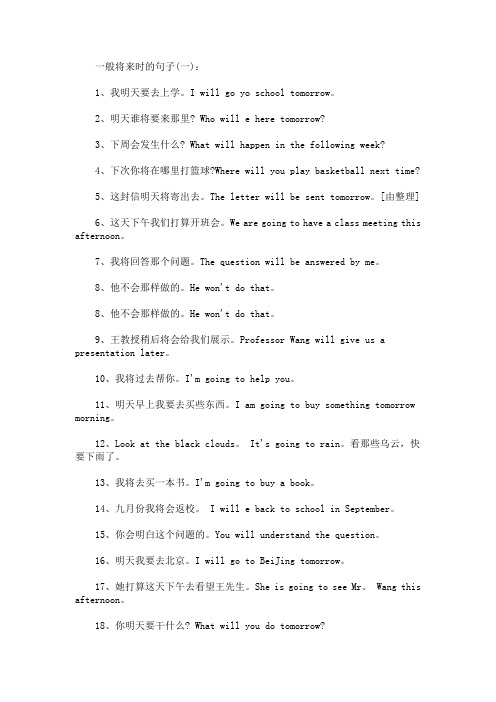
一般将来时的句子(一):1、我明天要去上学。
I will go yo school tomorrow。
2、明天谁将要来那里? Who will e here tomorrow?3、下周会发生什么? What will happen in the following week?4、下次你将在哪里打篮球?Where will you play basketball next time?5、这封信明天将寄出去。
The letter will be sent tomorrow。
[由整理]6、这天下午我们打算开班会。
We are going to have a class meeting this afternoon。
7、我将回答那个问题。
The question will be answered by me。
8、他不会那样做的。
He won't do that。
8、他不会那样做的。
He won't do that。
9、王教授稍后将会给我们展示。
Professor Wang will give us a presentation later。
10、我将过去帮你。
I'm going to help you。
11、明天早上我要去买些东西。
I am going to buy something tomorrow morning。
12、Look at the black clouds。
It's going to rain。
看那些乌云,快要下雨了。
13、我将去买一本书。
I'm going to buy a book。
14、九月份我将会返校。
I will e back to school in September。
15、你会明白这个问题的。
You will understand the question。
16、明天我要去北京。
I will go to BeiJing tomorrow。
一般将来时详解+例句

6.Only by practising a few hours every day ________ be able to play the piano well.
A.you wouldB.would youC.you willD.will you
【答案】D
【解析】
试题分析:考查倒装句和时态:句意:只有你每天练习几个小时,你才能把钢琴弹好。Only+副词/介词短语/状语从句+主句(主句用部分倒装),而且这句话的时间是every day,所以用一般现在时will,选D。
A.am going to takeB.takeC.have takenD.would take
【答案】A
【解析】
试题分析:考查时态。根据句中的时间状语this weekend,可以判断用将来时。英语中经常用现在进行时代替将来时。句意:——这个周末你有什么特别的计划?——是的,我打算带我女儿去迪斯尼。故A正确。
考点:考查倒装句和时态
点评:固定句式:it be一段时间before从句;当Before引导的时间状语从句中使用一般现在时的时候,前面的主句使用将来时。May放在句首,运用倒装句表示对对方的祝愿。
3.A good film producer must make sure that his films ____ fit into the needs of the changing market.
考点:考查倒装句和时态
7.— Tom! I forgot to bring my notebook this morning.
— Don’t worry! Iit for you.
A.will getB.getsC.am gettingD.am going to get
一般将来时的句型结构和例句

一般将来时的句型结构和例句1. 一般将来时的概念嘿,大家好!今天我们来聊聊一般将来时。
说到将来时,想必大家都有过这样的体验:想给朋友约个时间,或者规划个旅行,但又不知道该怎么表达对未来的期望和计划。
其实,一般将来时就像那颗星星,指引着我们走向未知的未来。
简单来说,它主要用来表示将来发生的事情。
这种时态很容易搞定,通常使用“will”或者“be going to”来构成,简单明了,不费吹灰之力。
2. 一般将来时的基本结构2.1 “will”结构首先,我们来看看用“will”构成的一般将来时。
它的句型结构就是:主语 + will + 动词原形。
比如,如果你想告诉朋友“我明天会去图书馆”,你可以说“I will go to thelibrary tomorrow。
”听起来是不是很顺畅呢?再比如,“她会参加派对”就可以说成“She will attend the party.”是不是感觉自己就像个未来学家?2.2 “be going to”结构接下来,我们聊聊“be going to”结构。
这个结构的形式是:主语 + be (am/is/are) + going to + 动词原形。
比如,“我打算去旅行”可以说“I am going to travel.” 这里的“going to”就像个小火箭,把我们的计划送向未来。
再来个例子:“他们准备去看电影”就可以说“They are going to watch a movie.” 听起来是不是很有干劲?3. 一般将来时的应用场景3.1 表达意图和计划那么,一般将来时到底在哪些场合能派上用场呢?哦,真是无处不在!比如,当你和朋友一起讨论周末的计划时,“我们将去海滩吗?”可以问“We will go to the beach, right?”或者,当你在职场上,需要告诉同事下周的会议时间时,“我们下周三会开会”可以说“We will have a meeting next Wednesday.” 这些都是日常生活中常见的场景,毫不费力地用上将来时,简直就是小菜一碟!3.2 预测未来此外,一般将来时也常用于预测未来。
将来时的各种形式及例句整理

将来时的各种形式及例句整理将来时是英语中用来表示将来动作或状态的一种时态,包含了多种形式。
在本文中,将介绍将来时的各种形式并提供相应的例句。
一、一般将来时一般将来时表示将来某个时间会发生的动作或状态。
一般将来时的构成方式如下:1. 主语 + will + 动词原形2. 主语 + be going to + 动词原形以下是一些例句:1. I will go to the movies tomorrow.(我明天会去看电影。
)2. They are going to have a party next week.(他们下周要开派对。
)3. She will learn to play the piano.(她将学会弹钢琴。
)二、将来进行时将来进行时表示将来某一时刻正在进行的动作。
将来进行时的构成方式如下:1. 主语 + will be + 动词ing以下是一些例句:1. They will be watching a movie at this time tomorrow.(明天此时他们将在看电影。
)2. She will be working on her project tomorrow morning.(明天早上她将在进行项目工作。
)三、将来完成时将来完成时表示将来某一时刻之前已经完成的动作。
将来完成时的构成方式如下:1. 主语 + will have + 过去分词以下是一些例句:1. By the time he arrives, I will have finished my homework.(等他到达时,我将已经完成作业。
)2. They will have left for Paris by the end of this month.(到本月末,他们将已经去巴黎了。
)四、将来完成进行时将来完成进行时表示将来某一时刻之前已经开始并且一直在进行的动作。
将来完成进行时的构成方式如下:1. 主语 + will have been + 动词ing以下是一些例句:1. By the time they arrive, we will have been waiting for three hours.(等他们到达时,我们将已经等待了三个小时。
一般将来时详解+例句
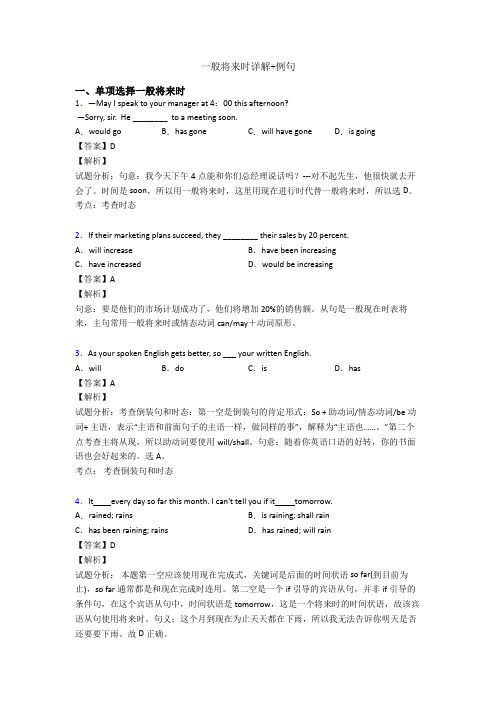
【解析】
B考察动词时态。句意:一种新款的鞋一旦投入市场,将会接到大量的订单,因为这种鞋的鞋跟高度可以在4到9厘米之间变化。If引导的状语从句,主句表示将来,从句用现在时代替将来时。光顾B正确。
14.If you _____ his wife’s income____ his own,the total of their income _____ 3000 yuan.
— Never mind. ________ it myself after school.
A.forget; I’d rather buyB.forgot; I’ll buy
C.forgot; I’m going to buyD.forget; I’d better buy
【答案】B
【解析】
【详解】
C.hadn’t showed upD.doesn’t show up
【答案】B
【解析】
试题分析:考查时态。根据语境及时间状语tomorrow afternoon可知用一般将来时。句意:——期望有多少人来参加你明天的宴会?——我送出了30份邀请,但三分之一将不会出现。故B正确。
考点:考查时态
19.— Sorry, I ________ to buy the book you need for you.
A.you wouldB.would youC.you willD.will you
【答案】D
【解析】
试题分析:考查倒装句和时态:句意:只有你每天练习几个小时,你才能把钢琴弹好。Only+副词/介词短语/状语从句+主句(主句用部分倒装),而且这句话的时间是every day,所以用一般现在时will,选D。
一般将来时例句(精选)

一般将来时例句(精选)“表示将来其中一时刻的动作或状态,或将来其中一段时间内经常的动作或状态。
接下来就由带来一般将来时例句,希望对你有所帮助!1、There will be a bad news for you。
将有一个坏消息给你。
2、There will be a delicious supper for us。
我们将有一顿美味的晚餐。
3、There will be a new dress for her。
她将有一条新裙子。
4、There will be a good news for you。
将有一个好消息给你。
5、There will be a show on the playground the day after tomorrow。
后天操场上将有一场表演。
6、There will be a concert tomorrow。
明天将有一场演唱会。
7、There will be a gift for me。
我将有一份礼物。
8、There will be a English class this afternoon。
今日午时有一节英语课。
9、There is going to have a English test next Monday。
下周一将有一次英语测验。
10、There will be a mobile phone tomorrow for me。
明天我将有一部手机。
11、There will be a fortable room for you tomorrow。
明天你将有一个舒适的房间。
12、There will be rain this evening。
今晚要下雨。
13、There will be television in our classroom。
我们教室将有一台电视机。
14、There will be a happy journey for her。
她将有一个愉快的旅程。
一般将来时详解+例句

【答案】C
【解析】
C考查时态。答语意为“别担心,我帮你去取。等一下。”此处will用于一般将来时,表示“将要做临时决定的事情”。
11.It's really time I went home but I'm enjoying myself, so I ________ here a bit longer.
考点:时态。
9.—Help me out in the kitchen and I ________ you to a cup of coffee.
—Sounds good.
A.will treatB.treat
C.am treatingD.have treated
【答案】A
【解析】
考查时态。句意:——要是你在厨房里帮我忙的话,我将请你喝咖啡。——听起来不错。根据对话语境可知,应用一般将来时。
试题分析:考查动词时态。
考点:考查动词时态。
6.--Jack! I have left my key to the office at home.
-- Don’t worry. I _________ it for you. Wait a minute.
A.getB.am going to getC.will getD.am getting
考点:考查时态和全部倒装句。
19.Why don’t you put the meat in the fridge? It will_______fresh for several days.
一般将来时的定义结构例句用法10

一般将来时的定义结构例句用法10一般将来时的定义结构例句用法10
结构:主语 + will + 动词原形
例句:
1. I will go to the store tomorrow.
(我明天会去商店。
)
2. He will call you later.
3. We will have a meeting next week.
(下周我们将开会。
)
4. She will study for the exam tonight.
(她今晚会复习考试。
)
5. They will visit their grandparents next month.
(他们下个月会去拜访他们的祖父母。
)
用法:
1.表达将来的计划或意图:
I will buy a new car next year.(我明年会买一辆新车。
)
2.表达预测或推测的动作或状态:
The weather will be sunny tomorrow.(明天天气会晴朗。
3.表示请求或许诺:
Will you help me with my homework?(你会帮助我做作业吗?)
4.用于条件句中,表示假设的动作或状态:
If it rains tomorrow, we will stay at home.(如果明天下雨,我们会呆在家里。
)
5.用于建议或邀请:。
【英语】一般将来时详解+例句

— I have rewritten it so many times that I wonder if I ________ it.
A.finishB.finishedC.have finishedD.will finish
【答案】D
【解析】
试题分析:考查时态。能不能写完应是将来发生的动作,因此应用将来时。句意:——Lucy,你的作文写得怎样了?——我重写了太多次了,我怀疑能不能写完。故D正确。
考点:考查时态
13.I’m sure your suggestion will ____the problem.
A.contribute to solvingB.be contributed to solving
A.will leaveB.is leaving
C.was leavingD.has left
【答案】C
【解析】
be doing可以用来表示将来,指按照时间安排表即将发生的事情,是有计划安排的;will do强调的是主观性,不表达按时间安排表即将发生的事情。句意:得知班里一个尖子生因为家庭原因要离开学校,班主任很焦虑。
A.are toB.willC.are going toD.are about to
【答案】A
【解析】
试题分析:考查将来时的表达法。Be to do sth表示计划的事情;表示注定要做某事;也可以表示命令做某事,相当于have to, must,should; will表示一般的将来,或者临时决定做某事;be going to do sth表示按照计划安排要做某事;或者根据某种迹象要做某事;be about to do sth即将做某事,不与表示将来时的时间状语连用。句意:好的电影出品人要确保他的电影应该满足不断变化的市场的需要。该句中的be to =should.故A正确。
一般将来时造句10句

一般将来时造句10句一般将来时表示将来某一时刻的动作或状态,或将来某一段时间内经常的动作或状态,常常和表示将来的时间状语连用。
那么你知道一般将来时要怎么造句子吗?下面店铺为大家整理了10句一般将来时的英语句子,欢迎大家参考学习!一、常见结构1、will / shall + 动词原形(否定句在will/shall后加not)这种方法一般单纯地表示将来某个时间将要发生的动作或存在的状态。
will用于各种人称;shall只用于第一人称。
例如 :I will / shall go to visit him next week. 下周我将去拜访他。
What time shall we go there tomorrow? 明天我们几点去那儿?2、be going to+动词原形be going to 相当于一个助动词(其中be有人称和数的变化),与它后面的动词原形一起构成谓语。
用来表示将要发生的动作以及计划、安排和打算要做的事。
例如:There is going to be a football match this afternoon.今天下午将有一场足球赛。
I‘m going to go to the park. 我将要去公园。
二、常用结构1、用于"I expect, I'm sure, I think, I wonder等的宾语从句"中。
Don't worry about the exam. I'm sure you'll pass.不要担心这次考试,我确信你会通过的。
2、用于祈使句和陈述句中。
Work hard and you will succeed.如果你努力,就会成功的。
3、与表示时间或条件的状语从句连用。
I'll let you know as soon as he arrives.他一到我就通知你。
1 Professor Wang will give us a presentation later.2 Who will come here tomorrow?3 I will visit you next month.4 What will happen in the following week?5 I will go to BeiJing tomorrow.6 What will you do tomorrow?7 Tom will come to my home at 3PM.8 England will play against France tomorrow.9 I will come back to school in September.10 Where will you play basketball next time?。
- 1、下载文档前请自行甄别文档内容的完整性,平台不提供额外的编辑、内容补充、找答案等附加服务。
- 2、"仅部分预览"的文档,不可在线预览部分如存在完整性等问题,可反馈申请退款(可完整预览的文档不适用该条件!)。
- 3、如文档侵犯您的权益,请联系客服反馈,我们会尽快为您处理(人工客服工作时间:9:00-18:30)。
9.It's really time I went home but I'm enjoying myself, so I ________ here a bit longer.
A.am stayingB.have stayed
C.stayedD.stay
【答案】A
【解析】
句意:尽管我现在该回家了,但我现在玩得正高兴,因此再多呆会儿。动词stay可以用进行时表示将来的动作,故选A项。
12.---Thank you for inviting us.Tell your wife that she gave us a perfect party.
---I______. See you later.
A.mustB.shouldC.willD.can
【答案】C
【解析】
试题分析:句意:谢谢你邀请我们,告诉你妻子她给我们提供了一个完美的聚会。--我会的,再见。Will表示“将会,临时决定,愿意”,must必须,should应该,can能,可能,所以选C。
14.If their marketing plans succeed, they ________ their sales by 20 percent.
A.will increaseB.have been increasing
C.have increasedD.would be increasing
4. be going to与will / shall, be to do, be about to do用法及区别:
(1)shall / will do表示未事先考虑过,即说话时临时作出的决定。
(2)be going to表示现在打算在最近或将来要做某事,这种打算往往经过事先考虑,甚至已做了某种准备;be going to表将来,不能用在条件状语从句的主句中;而will do则能,表意愿。
考点:考查情态动词
13.Come in and sit down and I ________ you what I've found recently.
A.showB.will show
C.showedD.was showing
【答案】B
【解析】
B考察动词时态。句义:进来坐下,我要给你看我最近发现的东西,祈使句后面接and/or连接陈述句中常常使用一般将来时。故使用will show。故B正确。
考点:考查动词时态。
7.— Lucy, how are you getting on with your composition?
— I have rewritten it so many times that I wonder if I ________ it.
A.finishB.finishedC.have finishedD.will finish
【答案】A
【解析】
句意:要是他们的市场计划成功了,他们将增加20%的销售额。从句是一般现在时表将来,主句常用一般将来时或情态动词can/may+动词原形。
15.It is only with the help of scientific research _____ bring PM1 air pollution under control.
(4)be about to do sth.表示“即将/正要去做某事”,通常不与时间状语连用,但可与when引导的从句连用,构成常考句型:sb was about to do sth when sb did sth。
例如:Autumn harvest is about to start.
— Oh, so I have. _____ and turn it off.
A.I goB.I’ve goneC.I’ll goD.I’m going
【答案】C
【解析】
试题分析:考查时态:句意:--你一直把灯开着。--哦,是的,我马上去,把它关了。这里用一般将来时,CD都可以表示一般将来时,will do可以表示临时决定,be going to do打算做,选C。
A.comes, comesB.will come, will come
C.comes, will comeD.will come, comes
【答案】D
【解析】
试题分析:考查时态:第一个when引导的主语从句,用将来时,第二个when引导的时间状语从但当他回来时,他会收到热烈的欢迎。选D。
【答案】C
【解析】
试题分析:考查时态:句意:--杰克!我把钥匙忘在办公室了。--别担心,我去帮你拿,等一会。根据句意是将要去拿。BCD都可以表示一般将来时,B项be going to do是计划将要做,D项是马上就做,C项will do可以表示“临时决定”,选C。
考点:考查时态
5.— You’ve left the light on.
考点:考查强调句结构
16.The students have been working hard on their lessons and their efforts _____ with success in the end.
A.rewardedB.were rewarded
C.will rewardD.will be rewarded
A.that we willB.we will
C.that we doD.do we
【答案】A
【解析】
试题分析:考查强调句结构。强调句的结构为it + be +强调部分+ that从句。此题强调状语only with the help of scientific research。句意:只有在科学研究的帮助,我们将PM1空气污染得到控制。故A正确。
【答案】B
【解析】
B句意:我确信既然他答应捐一笔钱给穷人,他绝不会食言的。by no means(绝不)为表示否定意义的介词短语,置于句首时,其后面的主谓语要倒装,根据句意可知设空处需用一般将来时,故答案为B项。
11.(陕西重点中学高三二模)We pursue happiness, thinking one day we will find it. But ________ it by seeking it.
A.he will realizeB.will he realizeC.that he realizesD.he does realize
【答案】B
【解析】
试题分析:句意:只有一个为人父母了,他才知道父母多么的伟大。Only+副词/介词短语/状语从句,并放在句首的时候,后面的主句用部分倒装,助动词/be动词/情态动词放在主语前面,所以选B。
A.will comeB.comesC.has comeD.would come
【答案】A
【解析】
试题分析:考查动词时态。句意:给他提姆买个手机怎么样?毕竟他不再是个孩子了。我认为是必要的,因为我们有时会想确认他是否会回来吃饭。根据句意这是一个宾语从句,确认他是否将回来吃饭,是一般将来时,A. will come一般将来时B. comes一般现在时C. has come现在完成时D. would come过去将来时,所以A正确。
【答案】D
【解析】
【分析】
【详解】
本题考查时态和语态。解题步骤:1.确定时态:根据句尾的in the end可知,事情发生在将来,用将来时。2.确定语态:efforts和reward是被动关系,应该使用被动语态。句意:学生们一直在刻苦学习功课,他们的努力终将会得到回报。综上,用一般将来时的被动,故选D。
例如:If it is fine, we’ll go fishing.(正确)
If it is fine, we are going to go fishing.(错误)
(3)be to do sth.表按计划、安排即将发生的动作,还可表示吩咐、命令、禁止,可能性等。
例如:A meeting is to be held at 3:00 o’clock this afternoon.
【点睛】
一般将来时
1.表示未来的动作或状态常用will / shall +动词(常与表示将来的时间状语边用如tomorrow、next week等)。
2.表示一种趋向或习惯动作。
例如:We’ll die without air or water.
3.表示趋向行为的动词如come, go, start, begin, leave等词常用进行时的形式表示将来时。
考点:考察时态
4.--Jack! I have left my key to the office at home.
-- Don’t worry. I _________ it for you. Wait a minute.
A.getB.am going to getC.will getD.am getting
【答案】D
【解析】
试题分析:考查时态。能不能写完应是将来发生的动作,因此应用将来时。句意:——Lucy,你的作文写得怎样了?——我重写了太多次了,我怀疑能不能写完。故D正确。
考点:考查时态
8.Only after one has become a parent _____ how great his parents are.
【答案】A
【解析】
试题分析:考查情态动词。句意是:你告诉Rose关于考试的事了吗?--哦,我忘了,我现在就打电话给她。这里用will表示临时决定,故选A项。
考点:考查情态动词
2.“When he _____ is not known yet.” “But when he ____, he will be warmly welcomed.”
【英语】一般将来时详解+例句
